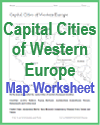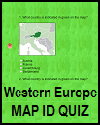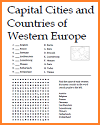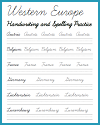Learning about the countries and geography of Western Europe is crucial for your eager K-12 students as it enhances their understanding of global interconnectedness, cultural diversity, and historical context. Western Europe, with its rich tapestry of nations, has played a pivotal role in shaping world history, politics, economics, and culture.
Firstly, understanding the geography of Western Europe helps your students grasp the significance of its physical features, such as the Alps, the Rhine River, and the Mediterranean coastline. These features have influenced settlement patterns, economic activities, and historical events. For example, the Rhine has been a crucial trade route, and the Alps have served as both a natural barrier and a site for tourism and winter sports.
Secondly, knowledge of Western European countries fosters cultural awareness and appreciation. Western Europe is home to diverse languages, traditions, and customs. By studying these countries, students can appreciate the cultural richness and learn to respect and value different ways of life. This cultural literacy is essential in an increasingly globalized world where cross-cultural communication and understanding are vital.
Moreover, Western Europe's historical influence is profound. It has been the birthplace of significant philosophical, scientific, and artistic movements. Understanding the Renaissance, the Enlightenment, and the Industrial Revolution, all of which have roots in Western Europe, provides students with insights into the development of modern society and thought. Learning about Western Europe's history also helps students understand contemporary global issues, such as the European Union's role in world affairs, the impact of colonialism, and the ongoing challenges of migration and integration.
Last but not least, studying the geography of Western Europe enhances your K-12 students' global awareness and prepares them for future careers (hopefully lucrative ones!) in our highly connected world. It encourages critical thinking about international relations, economic systems, and geopolitical strategies. This knowledge equips your pupils with the skills needed to navigate and contribute to our deeply complex and interconnected global community.
Learning about the countries and geography of Western Europe is absolutely essential for fostering your kids' cultural understanding, historical awareness, and global citizenship. It equips your students with the knowledge and skills necessary to engage thoughtfully and effectively with the world around them.
|






















